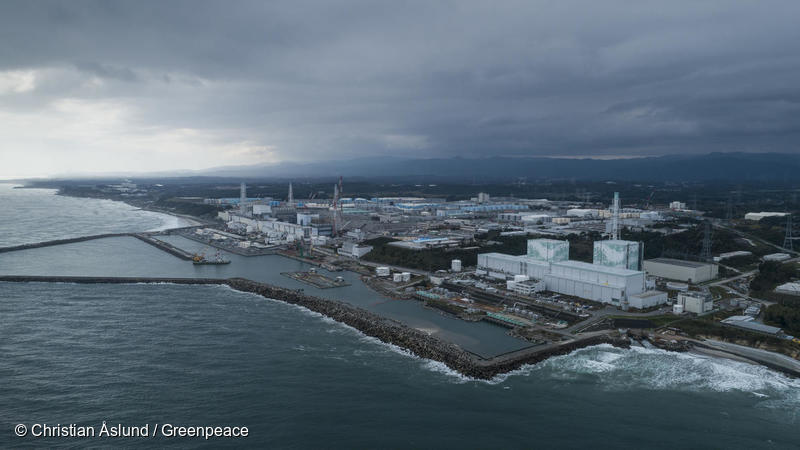NRA approval for Fukushima Daiichi radioactive pollution of the Pacific Ocean – no justification, no scientific basis and illegal – Greenpeace condemns decision
Tokyo, Japan – The final approval by Japan’s Nuclear Regulation Authority (NRA) of Tokyo Electric Power Company Holding (TEPCO) plans to discharge radioactive waste water into the Pacific Ocean has no justification, is based on incomplete and limited data and flawed analysis and violates international law, according to Greenpeace East Asia.

Shaun Burnie, a senior nuclear specialist from Greenpeace East Asia, said:
“The decision by Japan’s regulator to deliberately pollute the Pacific Ocean with radioactive waste water is as bad as it sounds. The NRA approval of the TEPCO contaminated water discharge plan is scientifically and technically flawed. It is a decision intended to support the false narrative that decommissioning the destroyed reactors at Fukushima Daiichi is making real progress. In reality the contaminated water plan is a symptom of the wider crisis that the current decommissioning plan is doomed. The discharges into the Pacific will not solve any problems but create many more. The NRA knows that a fundamental reassessment of the decommissioning plan is inevitable, and that will also mean choosing the least environmentally damaging option which is long term storage and processing.”
“The NRA has failed to assess many important issues that are fundamental to any environmental assessment. Further, it disregards the human rights of those most impacted by the 2011 disaster – the citizens of Fukushima prefecture, including fishing communities, as well as neighboring prefectures. It ignores the wider environmental marine impact and the rights of the peoples of the Asia Pacific region who are opposed to the deliberate pollution of the Pacific with radioactive waste,” said Burnie.
Japan is legally required under the UN Convention for the Law of the Sea to conduct a comprehensive Environmental Impact Assessment (EIA). No such assessment has been made or is planned either by Japan’s regulator or the International Atomic Energy Agency (IAEA). There are many legal issues that the NRA has just completely failed to consider.
The opposition to radioactive discharges continues to grow, including the efforts by the 18 nations of the Pacific Island Forum (PIF) to challenge the false scientific rationale for the radioactive pollution plans.
Greenpeace analysis on the Fukushima water crisis includes submissions to the NRA, IAEA, as well as two reports on the technical issues and problems with the management of contaminated water at the site and discharge plans.
ENDS
Notes:
See “TEPCO WATER CRISIS”, Greenpeace Germany, January 2019
And, “Stemming the tide 2020: The reality of the Fukushima radioactive water crisis”, Greenpeace East Asia, October 2020